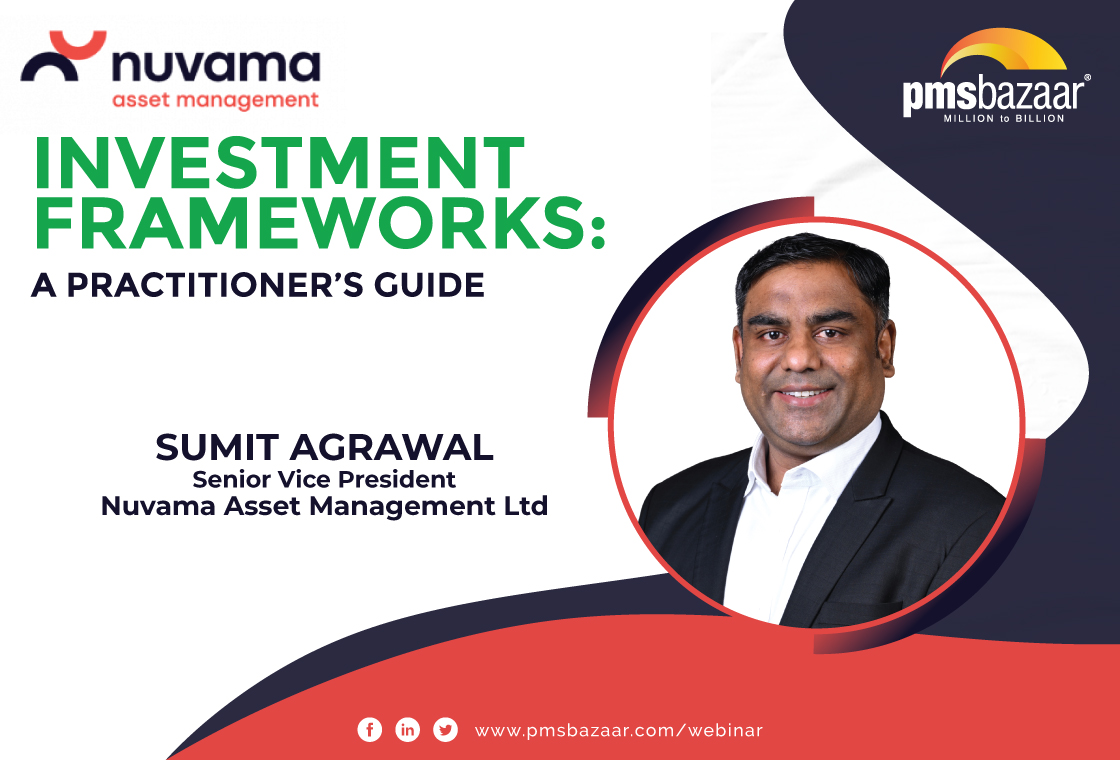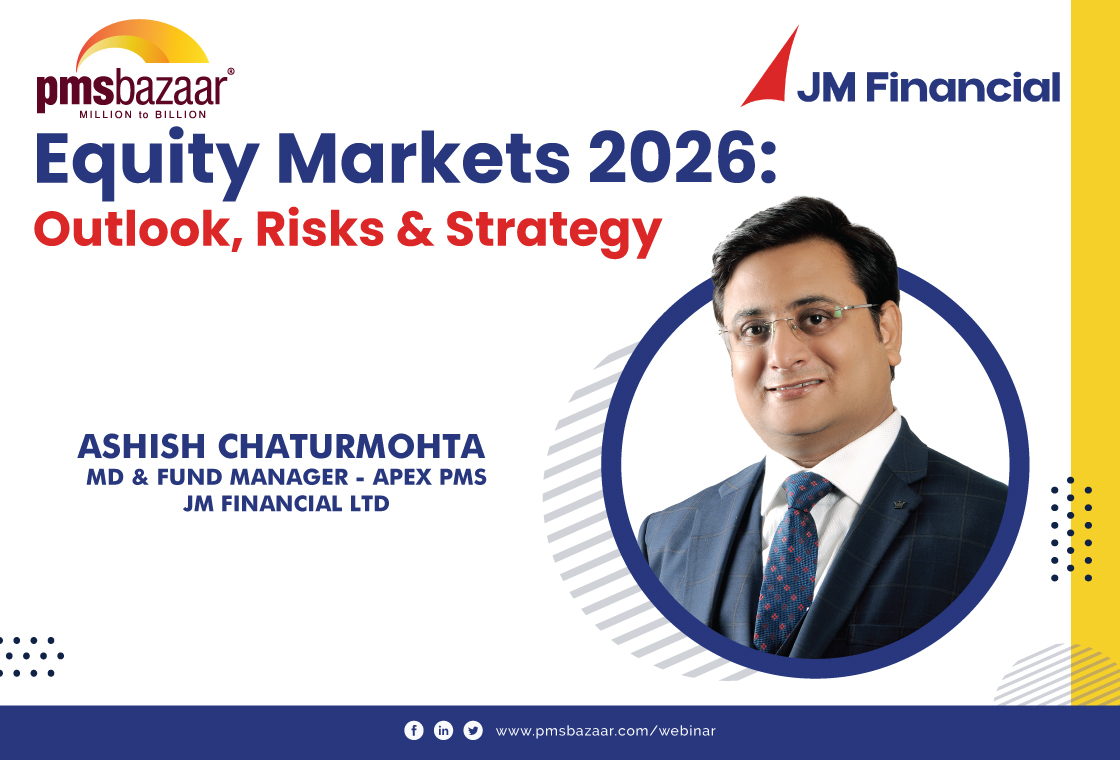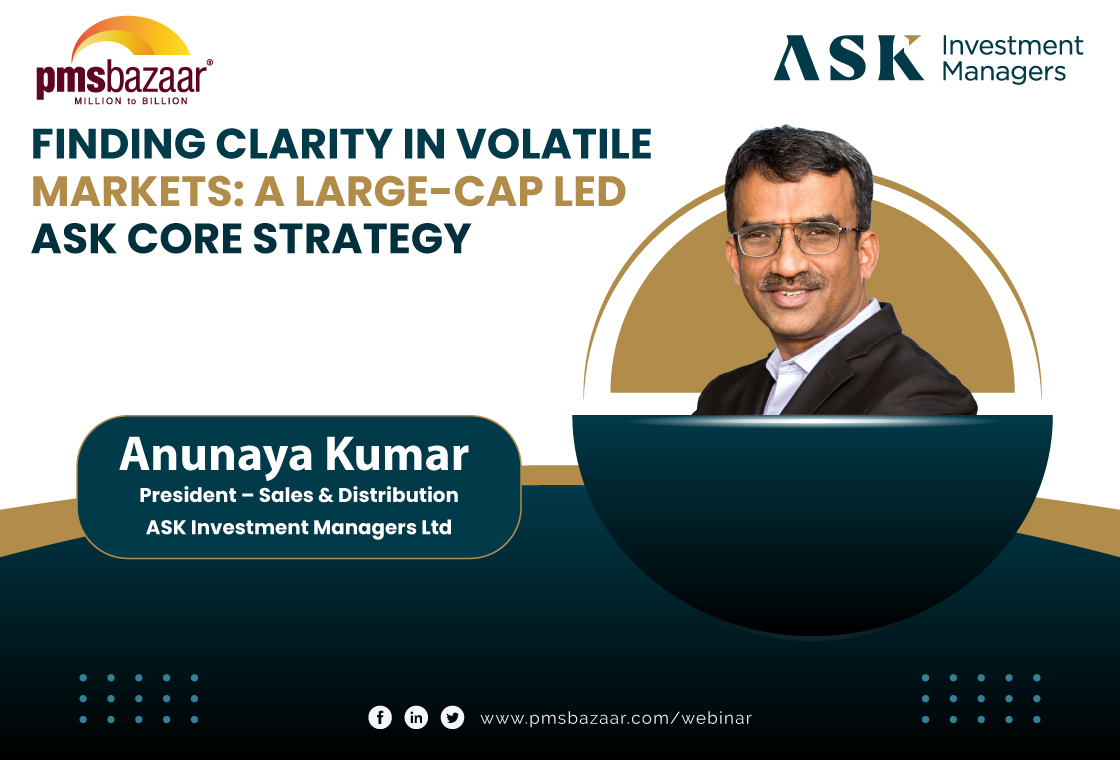This Blog Summarises the key insights shared by Siddharth Bothra, Executive Director & Fund Manager, Ambit Asset Management, at our exclusive webinar on - "The Snowball Effect & Changing Cycles of Investing."

Organised by PMS Bazaar, the webinar was centred around the evolving investment landscape following the COVID-19 pandemic and a shift towards quality investments in response to dynamic market triggers. It also covered the historical outperformance of quality stocks and emphasised the importance of long-term investing and business fundamentals for sustainable wealth creation.
Key aspects covered in this webinar blog are
- Return to quality-style of investments
- Market challenges and impacts
- Behavioural biases and long-term thinking
- Case study and sectoral preferences
- Risk management and market outlook
Return to quality-style of investments
Bothra highlighted a significant post-COVID market recovery driven by high beta and cyclical stocks. However, he argued that investors should focus on protecting their capital by investing in high-quality stocks. Based on data analysis, he showed that quality investments historically outperformed others across various market cycles. He cited research indicating that quality stocks outperformed by 88% over extended periods and were resilient during corrections.
Bothra also examined market cycles over the past decades. He found that quality investments consistently performed well during recovery, slowdown, and contraction phases. They only underperformed during rapid expansion periods, like those seen with high-beta rallies. He pointed out a recent anomaly where lower-quality stocks outperformed higher-quality ones, which he argued reflected current market exuberance.
Bothra addressed behavioural biases in investment decisions. He compared stock market behaviour to gambling psychology. He noted that retail investors often chase high-risk, high-reward opportunities, ignoring factors like probability and sustainability. He predicted potential market corrections due to regulatory interventions in derivative markets and policy changes after elections. He anticipated liquidity challenges and warned of upcoming adjustments in market dynamics.
Market challenges and impacts
Bothra highlighted the challenges posed by certain market dynamics, which could turn into unforeseen difficulties. These challenges, often hidden until they emerge, could significantly impact high-risk stocks. He referenced a report that showed investor losses in this segment amounting to nearly one lakh crore.
He stated that there was a noticeable shift in government focus towards rural revitalisation after the elections. This change responded to observed stress and slow growth rates in various sectors such as FMCG, passenger cars, and two-wheelers. Government spending on rural initiatives had decreased from an average of 2.6% to 1.6%, contrasting with a rising capex. This suggested a need for a renewed focus on rural areas to improve conditions for those at the bottom of the market.
Bothra analysed post-COVID market trends and observed a decline in aggregate profit growth rates. At the same time, market valuations, particularly market cap to GDP ratios, were historically high at 136%, suggesting potential challenges from overvaluation in the future.
In the face of these challenges, Bothra advocated for a strategic shift towards quality investments as a way to create wealth in the long term. Referring to the "snowball effect" in investing, he emphasised the importance of identifying enduring compounders – companies with sustainable competitive advantages and proven track records of wealth creation over decades.
Behavioural biases and long-term thinking
Understanding and mitigating behavioural biases is crucial for making sound investment decisions. Bothra drew parallels between stock market behaviour and gambling psychology, highlighting a tendency among retail investors to chase high-risk, high-reward opportunities without adequately considering probability and sustainability.
A cornerstone of Bothra's investment philosophy is the emphasis on long-term thinking, particularly embracing the power of compounding. He cautioned against the pitfalls of short-term thinking, where investors prioritise quarterly or six-monthly gains over long-term wealth accumulation. This myopic view can severely hinder the potential for significant wealth creation over time.
Bothra stressed the importance of prioritising a company's fundamental business performance over short-term stock price fluctuations. Instead of being swayed by daily market volatility, investors should focus on identifying companies with robust fundamentals and sustainable growth trajectories.
Bothra further cautioned against blindly following the crowd, emphasising the need for independent thinking in investment decision-making. He argued that prioritising long-term capital protection and alpha generation over asset gathering fosters sustainable growth.
Case study and sectoral preferences
Bothra showcased Abbott India as a prime example of successful compounding in action. Established over a century ago and publicly listed for over 75 years, Abbott India boasts a consistent track record of sales and profit growth. Despite its robust performance, the company trades at a significant valuation discount compared to its peers, highlighting its potential for sustained wealth creation.
Bothra stated about identifying enduring investment opportunities within specific sectors. He highlighted consumer goods, technology, pharmaceuticals, and financial services as sectors that have consistently generated multi-bagger returns over time. He emphasised the importance of focusing on sub-segments within these sectors, such as consumer discretionary and fintech, which continue to evolve with new entrants like Zomato and HDFC AMC, thereby expanding market opportunities.
Bothra acknowledged the transformative impact of technological advancements across industries, emphasising the need to identify companies well-positioned to capitalise on these disruptions. While India may not currently rival global leaders like Nvidia in hardware, businesses leveraging AI and data-driven models, such as Zomato, hold significant growth potential.
Risk management and market outlook
Bothra stressed the importance of proactive risk management, emphasising the need to prepare for unexpected market downturns, often referred to as "black swan" events. He advocated for a portfolio construction approach that prioritised quality and resilience to mitigate downside risks effectively, thereby ensuring consistent performance even during adverse market conditions.
Looking ahead, Bothra anticipated a shift in market dynamics, with a renewed emphasis on quality and capital protection in the face of evolving economic conditions. He encouraged investors to adjust their expectations towards sustainable absolute performance rather than chasing short-lived market trends.
Siddharth Bothra shared an in-depth analysis of various topics related to the webinar. He also answered questions from the audience toward the end of the session. For more insights, watch the recording of this session through the link below.
Get access to rich data and analytics of PMS & AIF by subscribing to us. Join the 65000+ investors & experts: Subscribe NOW
Recent Blogs

January Rout, Extreme Dispersion: PMS Returns Swing From Losses to Gains
Benchmark falls deepened losses, but multi-asset and debt cushioned portfolios meaningfully

Investment Frameworks : A Practitioner’s Guide
PMS Bazaar recently organized a webinar titled “Investment Frameworks: A Practitioner’s Guide,” which featured Mr. Sumit Agrawal, Senior Vice President, Nuvama Asset Management Limited. This blog covers the important points shared in this insightful webinar.

Aurum Multiplier Portfolio - Where Small and Mid-Cap Alpha Meets Large-Cap Stability
PMS Bazaar recently organized a webinar titled “Aurum Multiplier Portfolio - Where Small and Mid-Cap Alpha Meets Large-Cap Stability,” which featured Mr. Sandeep Daga, MD& CIO, Nine Rivers Capital and Mr. Kunal Sabnis, Portfolio Manager, Nine Rivers Capital. This blog covers the important points shared in this insightful webinar.

Flat Markets, Wide Outcomes: How 484 PMS Strategies Performed in Dec 2025
December 2025 was a month where market returns stayed close to flat, with the Nifty 50 TRI at -0.28% and the BSE 500 TRI at -0.24%.

Equity Markets 2026: Outlook, Risks and Strategy
PMS Bazaar recently organized a webinar titled “Equity Markets 2026: Outlook, Risks and Strategy,” which featured Mr. Ashish Chaturmohta, MD & Fund Manager – APEX PMS, JM Financial Limited. This blog covers the important points shared in this insightful webinar.

MICRO CAPS: The Dark Horses of the Indian Equity Market
PMS Bazaar recently organized a webinar titled “MICRO CAPS: The Dark Horses of the Indian Equity Market,” which featured Mr. Rishi Agarwal and Mr. Adheesh Kabra, both Co-Founders and Fund Managers, Aarth AIF. This blog covers the important points shared in this insightful webinar.

Finding Clarity in Volatile Markets: A Large-Cap Led ASK CORE Strategy
PMS Bazaar recently organized a webinar titled “Finding Clarity in Volatile Markets: A Large-Cap Led ASK CORE Strategy,” which featured Mr.Anunaya Kumar, President – Sales and Distribution ASK Investment Managers Limited. This blog covers the important points shared in this insightful webinar.
.jpg)
Passively Active Investing — A Modern Investor’s Lens on ETF-Based PMS
PMS Bazaar recently organized a webinar titled “Passively Active Investing — A Modern Investor’s Lens on ETF-Based PMS,” which featured Mr. Karan Bhatia, Co-Founder and Co-Fund Manager , Pricebridge Honeycomb ETF PMs. This blog covers the important points shared in this insightful webinar.

